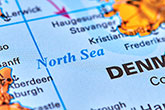INEOS and partners announce FID on EU’s first full-scale carbon dioxide storage facility
Published by Poppy Clements,
Assistant Editor
Tanks and Terminals,
With the aim of initiating storage operations into the INEOS-operated Nini field in the Danish North Sea at the end of 2025/early 2026, ‘Greensand Future’ will become the EU’s first operational CO2 storage facility intended to mitigate climate change. The FID paves the way for expected investments of more than US$150 million across the Greensand CCS value chain to scale storage capacity.
Sir Jim Ratcliffe, Chairman of INEOS, said: "This is a breakthrough for carbon capture and storage. Greensand Future will be the first CO2 storage facility in operation in the EU supporting both Danish and the EU’s climate objectives.”
Greensand Future is a full industrial CCS value chain built on a scalable platform. This platform allows for the gradual expansion of storage capacity as CO2 volumes increase. It is directly applicable to other onshore and offshore storage projects, contributing to the much-needed global acceleration of CCS deployment.
Mads Gade, Head of Denmark, INEOS Energy, said: “With Greensand Future and the establishment of the full value chain we are sending an important message to the Danish and European emitters currently considering large-scale capture projects, that it can be done.”
Greensand Future aims to safely capture and permanently store 400 000 tpy of CO2 as a start, allowing for the gradual expansion of storage capacity towards 2030 as CO2 volumes increase with a potential to store up to 8 000 000 tpy of CO2.
The European Commission has estimated that the EU will need to establish a carbon storage capacity of 250 million tpy of CO2 by 2040 to achieve the objectives of the Paris Agreement. CCS is also considered a key technology in reaching the Danish 2045 net-zero targets.
The CO2 in the first phase of Greensand Future will be captured and liquified at Danish biomethane production plants, transported to the port of Esbjerg, and then shipped by Royal Wagenborg to the Nini field in the Danish North Sea for safe and permanent storage.
Last year, on 8 March 2023, the INEOS-led pilot Project Greensand conducted the world’s first cross-border offshore CO2 storage intended to mitigate climate change as His Majesty King Frederik of Denmark officially initiated the first injection of CO2 into the Nini field during the pilot phase of Project Greensand.
Mads Gade said: “Last year we were the first in the world to succeed in developing a value chain for safe and efficient capture, transport and storage of CO2 across national borders. Now we are proud to take the next step, building on the learnings from the pilot and aiming to deliver a fully operational commercial project by end 2025/early 2026.”
The results of Project Greensand have been verified by the independent and world-leading provider of risk, verification and standardisation services, DNV. The thorough technical verification ensures that the stored CO2 remains safely and permanently in the closed Nini West reservoir 1800 m below the North Sea seabed, as expected.
Read the article online at: https://www.tanksterminals.com/storage-tanks/10122024/iineos-and-partners-announce-fid-on-eus-first-full-scale-carbon-dioxide-storage-facility/
You might also like
Hydrocarbon Engineering Podcast
Peter Davidson, CEO of the Tank Storage Association (TSA), joins us to discuss the essential role that the tank storage sector has to play in ensuring supply security and resilience, as well as in facilitating the energy transition.
LBC, ABP, and North Sea Port partner to advance carbon shipping in the North Sea
LBC, Associated British Ports, and North Sea Port have signed an MoU to develop a CCS terminal and shipping corridor connecting Northwest Europe with the UK.


